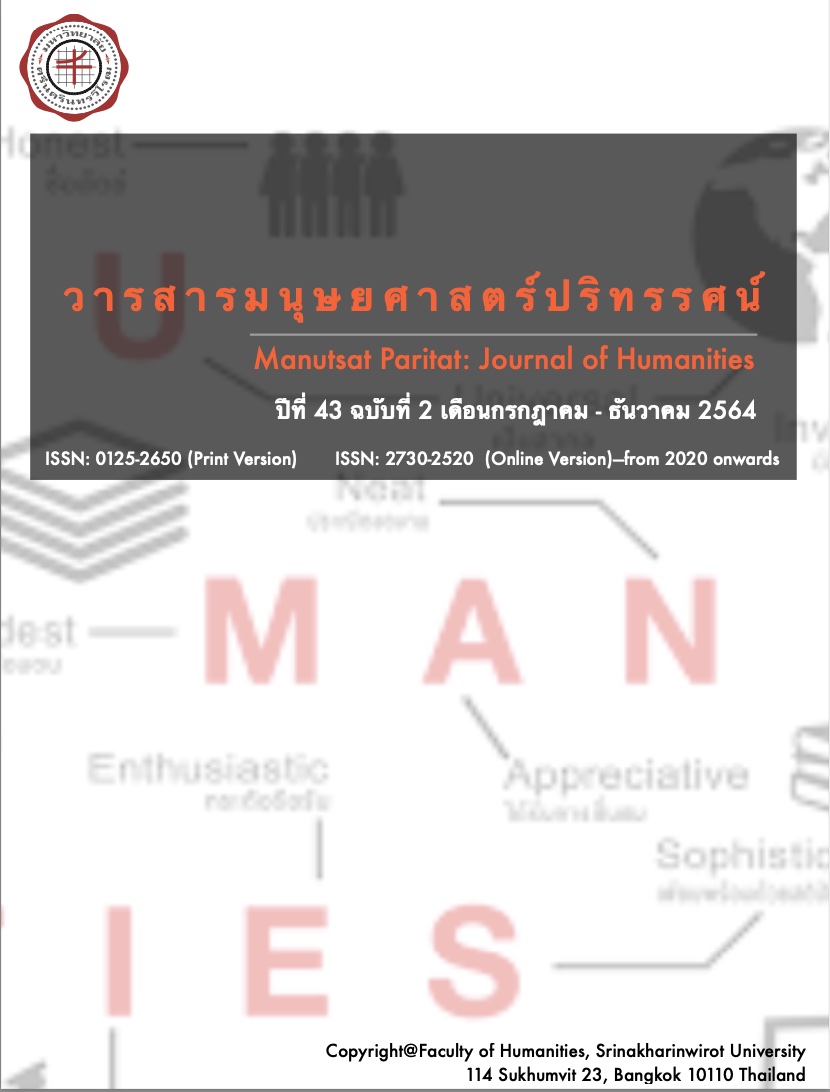Health Psychological Capital: Needs Assessment and Effects on Personal Psychological Well-Being
Main Article Content
Abstract
ทุนจิตวิทยาด้านสุขภาพประกอบด้วยการรับรู้ความสามารถ การมองโลกในแง่ดี ความหวัง และการฟื้นพลังเกี่ยวกับสุขภาพมีความสัมพันธ์กับผลลัพธ์ด้านสุขภาพ ทุนจิตวิทยาด้านสุขภาพสำคัญต่อสุขภาพของบุคคล แต่การศึกษาภาวะสันนิษฐานนี้ยังมีจำนวนน้อย วัตถุประสงค์การวิจัยนี้ คือ เพื่อ 1) ศึกษาระดับทุนจิตวิทยาด้านสุขภาพของนิสิตนักศึกษาสถาบันการศึกษาแห่งหนึ่ง 2) ระบุและจัดลำดับความสำคัญของความต้องการจำเป็นเกี่ยวกับทุนจิตวิทยาด้านสุขภาพของนิสิตนักศึกษาสถาบันการศึกษาแห่งหนึ่ง และ 3) ศึกษาอิทธิพลของทุนจิตวิทยาด้านสุขภาพที่มีต่อสุขภาวะทางจิตของนิสิตนักศึกษาสถาบันการศึกษาแห่งหนึ่ง ผู้เข้าร่วมวิจัย ได้แก่ นิสิตนักศึกษาจากมหาวิทยาลัยแห่งหนึ่งในเขตกรุงเทพมหานคร 192 คน เครื่องมือวิจัย ได้แก่ มาตรวัดความต้องการจำเป็นเกี่ยวกับทุนจิตวิทยาด้านสุขภาพที่มีลักษณะเป็นการตอบสนองคู่ และมาตรวัดสุขภาวะทางจิต การวิเคราะห์ข้อมูลประกอบด้วยค่าเฉลี่ย ส่วนเบี่ยงเบนมาตรฐาน ค่า modified Priority Needs Index (PNImodified) และการวิเคราะห์ถดถอยพหุคูณ ผลวิจัย พบว่า ทุนจิตวิทยาด้านสุขภาพโดยรวม การมองโลกในแง่ดีด้านสุขภาพ และการฟื้นพลังด้านสุขภาพในปัจจุบันของนิสิตนักศึกษาอยู่ในระดับสูง (M=3.62, SD=.47; M=4.20, SD=.57 และ M=3.57, SD=.65 ตามลำดับ) ส่วนการรับรู้ความสามารถด้านสุขภาพ และความหวังด้านสุขภาพอยู่ในระดับปานกลาง (M=3.27, SD=.57 และ M=3.44, SD=.67 ตามลำดับ) ความต้องการจำเป็นเกี่ยวกับการรับรู้ความสามารถด้านสุขภาพมีลำดับความสำคัญสูงสุด (PNImodified = .23) ส่วนความต้องการจำเป็นเกี่ยวกับความหวังด้านสุขภาพ การฟื้นพลังด้านสุขภาพ และการมองโลกในแง่ดีด้านสุขภาพมีความสำคัญอยู่ในลำดับถัดมา (PNImodified = .21, .19, และ .07 ตามลำดับ) และพบว่าการรับรู้ความสามารถด้านสุขภาพ และการฟื้นพลังด้านสุขภาพมีอิทธิพลทางบวกต่อสุขภาวะทางจิตอย่างมีนัยสำคัญทางสถิติที่ระดับ .01 และ .001 ตามลำดับ (β=.251 และ β=.358)
Article Details
Any unauthorized copying, publication, reproduction or distribution of copyrighted works appeared in Manutsat Paritat: Journal of Humanities is an infringement of the copyright owners’ rights. To authorize the copying, publication, reproduction or distribution of copyrighted works to be appeared in other printed materials or any online media, please write to MPJHthaijo@gmail.com for permission.
References
American Psychological Association. (2007). APA dictionary of psychology. Washington, DC: American Psychological Association.
Abolghasemi, A., & Varaniyab, S. T. (2010). Resilience and perceived stress: Predictors of life satisfaction in the students of success and failure. Procedia-Social and Behavioral Sciences, 5, 748-752. DOI: https://doi.org/10.1016/j.sbspro.2010.07.178
Cameron, J. E., Voth, J., Jaglal, S. B., Guilcher, S. J., Hawker, G., & Salbach, N. M. (2018). “In this together”: Social identification predicts health outcomes (via self-efficacy) in a chronic disease self-management program. Social Science & Medicine, 208, 172-179. DOI: https://doi.org/10.1016/j.socscimed.2018.03.007
Dark-Freudeman, A., & West, R. L. (2016). Possible selves and self-regulatory beliefs: Exploring the relationship between health selves, health efficacy, and psychological well-being. The International Journal of Aging and Human Development, 82(2-3), 139-165. DOI: https://doi.org/10.1177%2F0091415015627666
Hair, J. F., Black, W. C., Babin, B. J., & Anderson, R. E. (2014). Multivariate data analysis (new international edition). Essex, UK: Pearson Education Limited.
Harms, P. D., Vanhove, A., & Luthans, F. (2017). Positive projections and health: An initial validation of the implicit psychological capital health measure. Applied Psychology, 66(1), 78-102. DOI: https://doi.org/10.1111/apps.12077
Ibironke, S. O., & Donald, D. U. (2015). Personality factors, dispositional optimism and single parenting as predictors of psychological wellbeing among undergraduates. World Journal of Pharmacy and Pharmaceutical Sciences, 4(7), 196-212. Retrieved from https://www.semanticscholar.org /paper/PERSONALTY-FACTORS%2C-DISPOSITIONAL-OPTIMISM-AND-AS-Ibironke-Donald/517fb48643057bf238a22509366be2d4b136e2f9
Luthans, F., Avey, J. B., Avolio, B. J., & Peterson, S. J. (2010). The development and resulting performance impact of positive psychological capital. Human Resource Development Quarterly, 21(1), 41-67. DOI: https://doi.org/10.1002/hrdq.20034
Luthans, F., Luthans, K. W., & Luthans, B. C. (2004). Positive psychological capital: Beyond human and social capital. Business Horizons, 47(1), 45-50. DOI: https://doi.org/10.1016/j.bushor.2003.11.007
Luthans, F., Youssef, C. M., & Avolio, B. J. (2007). Psychological capital: Developing the human competitive edge: Oxford University Press.
Luthans, F., Youssef, C. M., Sweetman, D. S., & Harms, P. D. (2013). Meeting the leadership challenge of employee well-being through relationship PsyCap and health PsyCap. Journal of leadership & organizational studies, 20(1), 118-133. DOI: https://doi.org/10.1177%2F1548051812465893
Paul, M., & Sahoo, K. (2017). Role of spirituality as a positive psychological capital tool in prediction of emotions and subjective well-being among management students. In P. Bhatt, P. Jaiswal, B. Majumdar & S. Verma (eds.), Riding the new tides: Navigating the future through effective people management, pp.224-233. New Delhi: Emerald Publishing.
Salami, S. O. (2010). Occupational stress and well-being: Emotional intelligence, self efficacy, coping, negative affectivity and social support as moderators. The Journal of International Social Research, 3(12), 387-398. Retrieved from https://citeseerx.ist.psu.edu/viewdoc/download? doi=10.1.1.476.7097&rep=rep1&type=pdf
Sunita, D., & Jha, A. (2011). Training need assessment: A critical study. International Journal of Information Technology and Knowledge Management, 4(1), 263-267. Retrieved from http://csjournals.com/ IJITKM/PDF%204-1/51.pdf
Vinothkumar, M., & Prasad, N. (2016). Moderating role of resilience in the relationship between grit and psychological well-being. International Journal of Psychology and Psychiatry, 4(2), 10-23. DOI: http://dx.doi.org/10.5958/2320-6233.2016.00009.2
Rattanapisit C., & Leesattrupai C. (2015). Effects of kalayana dialogue, prejudice, and life skills on psychological well-being of undergraduate students in Bangkok. Journal of Humanities, 37(2), 47-66. Retrieved from http://ejournals.swu.ac.th/index.php/hm/article/view/7084/6583
Vanno, V. (2019). Development and validation of health psychological capital scale for Thai population. Journal of Public Health, 49(2), 170-183. Retrieved from https://he02.tci-thaijo.org/index.php/jph /article/view/143560
Vanno, V. (2018). The development of health psychological capital scale for Thai populations. (Research Report). Bangkok: Srinakharinwirot University.
Wongwanich, S. (2015). Needs assessment research (3rd ed.). Bangkok: Chulalongkorn University Press.


